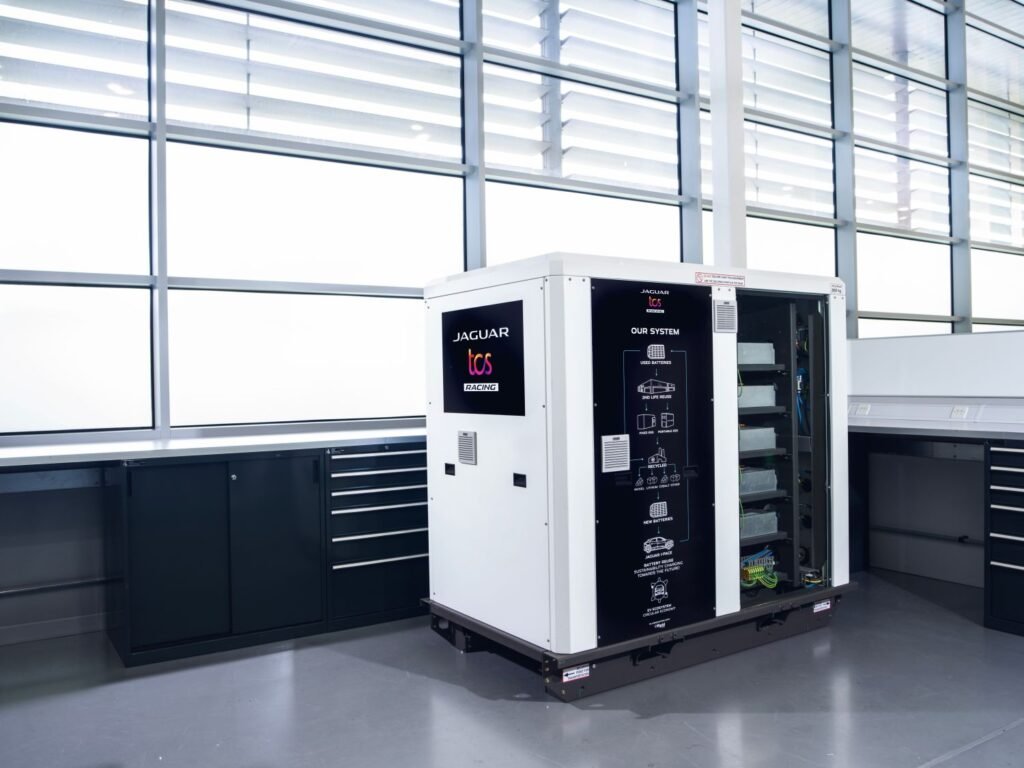Jaguar’s engineering team have worked with Pramac to develop a zero-emission energy storage unit powered by second-life Jaguar I-PACE batteries, taken from prototype and engineering test vehicles.
Called the Off Grid Battery Energy Storage System (ESS), Pramac’s technology – which features lithium-ion cells from one-and-a-half second-life Jaguar I-PACE batteries, supplies zero-emission power where access to the mains supply is limited or unavailable. To showcase its capability, the unit helped Jaguar TCS Racing prepare for the 2022 ABB FIA Formula E World Championship during testing in the UK and Spain, where it was used to run the team’s cutting-edge diagnostic equipment analysing the race cars’ track performance, and to supply auxiliary power to the Jaguar pit garage.
The testing and validation of the Off GridBattery ESS by Jaguar TCS Racing is demonstration of race-to-road-to-race cyclical technology transfer. Learnings from Jaguar TCS Racing have previously informed a software-over-the-air (SOTA) update for I-PACE customers that delivered a real-world range increase of up to 20 km – and now further use cases for the Off Grid Battery ESS around the racing team’s programme are being assessed. The lights go green for rounds four and five of the Formula E World Championship in Rome on 09 and 10 April.

The flagship ESS system has a capacity of up to 125 kWh – more than enough to fully charge Jaguar’s multi-award-winning all-electric I-PACE performance SUV, or to power a regular family home for a week*. Charged from solar panels, the unit is a self-contained solution that consists of a battery system linked to a bi-directional converter and the associated control management systems. Available for commercial hire, the units are fitted with Type 2 Electric Vehicle (EV) charge connections with dynamic control and rated at up to 22 kW AC to allow electric vehicle charging.
Finding a second life for batteries after they have been removed from vehicles can avoid premature recycling and help create a secure supply of rare materials. The state-of-the-art 90 kWh Lithium-ion battery in the Jaguar I-PACE delivers up to 294 kW and 696 Nm of instant torque enabling acceleration from 0-100 Km/h in just 4.8 seconds. The battery was also developed for the durability to match its outstanding performance and efficiency, and I-PACE customers benefit from a battery warranty of 8-years or 160 000 km, during which it must maintain at least 70 per cent State of Health.
This advanced engineering makes the I-PACE battery perfect for second-life, and even third-life, applications in low-energy situations once battery health falls below the stringent requirements of an electric vehicle. Once the battery does finally come to the end of its usable life, it is 95 per cent recyclable.
As well as collaborating with industry leaders such as Pramac, Jaguar TCS Racing has committed its long-term future to the Gen3 era of Formula E. The team will further help Jaguar Land Rover develop new sustainable technologies, set new benchmarks in quality with its partners and support Jaguar’s renaissance as an all-electric luxury brand from 2025.


